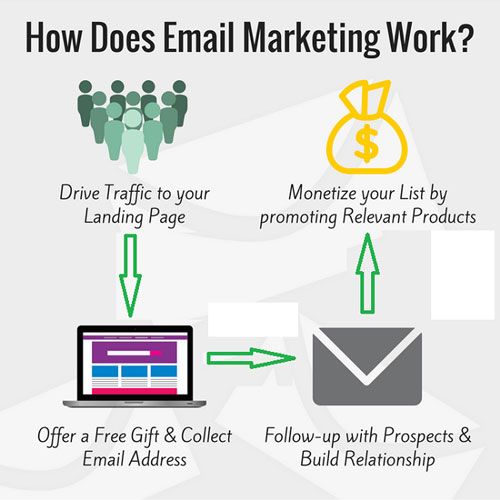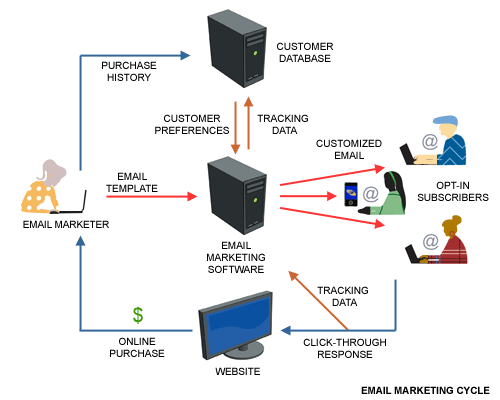Email marketing works by sending targeted messages to a list of subscribers to promote products or services. Businesses use these emails to build relationships, drive sales, and keep customers engaged.
Email marketing is a powerful tool for businesses of all sizes. By crafting personalized and relevant messages, companies can directly reach their audience’s inboxes. This form of marketing not only helps in generating leads but also in nurturing existing customer relationships.
Effective email campaigns often include compelling subject lines, clear calls to action, and valuable content. Tracking metrics like open rates and click-through rates helps businesses refine their strategies. With a well-executed email marketing plan, companies can significantly boost their engagement and revenue.

Credit: www.deskera.com
The Essence Of Email Marketing
Email marketing is a tool for businesses. It helps reach many people fast. Companies send newsletters, offers, and updates. These emails go directly to customers’ inboxes. This creates a personal touch. Email marketing is cost-effective. It has a high return on investment. Businesses can track email performance. This includes open rates and click rates. Adjustments can be made based on these metrics.
Emails are still important today. People check their emails every day. Emails are direct and personal. They build trust with customers. Emails can be tailored to each person. This makes them feel special. Businesses can share detailed information. This is not easy on social media. Emails are also easy to share. People can forward them to friends. This spreads the message further.
Starting With Email Marketing
Start by gathering emails from visitors. Use sign-up forms on your website. Offer something valuable in return. This could be a free eBook or a discount. Ensure the form is easy to fill. Keep it short and simple. Avoid asking for too much information. People may get discouraged.
Select a platform that meets your needs. Look for user-friendly options. Many platforms offer free trials. Test a few before deciding. Check for features like templates and analytics. Make sure it fits your budget. Some popular choices include Mailchimp and Constant Contact. These tools help manage your campaigns efficiently.
Crafting Compelling Campaigns
Good email content grabs attention fast. Use short sentences and simple words. Place the most important information at the top. Images and graphics can make emails more engaging. Always include a clear call-to-action. Links and buttons help readers take the next step.
Personalized emails feel special to readers. Use their names and preferences. Segment your email list. Groups based on age, location, or interests work best. Each group gets content they like most. This makes readers more likely to engage.

Credit: www.lsoft.com
Navigating Legalities And Best Practices
The CAN-SPAM Act sets rules for commercial emails. It gives recipients the right to stop you from emailing them. Always include a clear way to opt out. Use honest subject lines and headers. Identify the message as an ad. Provide a valid physical postal address. Monitor what others do on your behalf.
Send emails only to those who have opted in. Avoid buying email lists. Personalize messages to make them relevant. Keep your email list clean. Remove inactive subscribers regularly. Always provide value in your emails. Avoid deceptive subject lines. Be transparent about your identity. Respond quickly to unsubscribe requests. Respect your audience’s preferences.
Measuring Success And Performance
Email marketing uses many metrics. Open rate measures how many people open your emails. Click-through rate shows who clicked on links in your emails. Conversion rate tells how many people took an action, like buying something. Bounce rate shows emails that didn’t reach the inbox. Unsubscribe rate tells how many people left your email list. These metrics help improve your email strategy.
A/B testing helps find the best email version. Send two different emails to small groups. See which one performs better. Use the best email for the rest of your list. Analytics tools track performance. They provide detailed reports. Use these reports to improve future emails. Better emails lead to more success.

Credit: synapsereality.io
Advanced Email Marketing Techniques
Discover advanced email marketing techniques that boost engagement and conversions. Understand how targeted campaigns and personalized content work to increase ROI effectively.
Incorporating Automation
Automation makes email marketing easy. It sends emails at the right time. This helps keep customers engaged. It also saves time and effort. Automatic emails can greet new subscribers. They can also send special offers. This makes customers happy and loyal.
Leveraging Ai For Targeted Campaigns
AI helps create smart email campaigns. It analyzes customer data. This finds out what customers like. Then, it sends them personalized emails. AI can also predict future trends. This keeps your emails relevant and timely. Using AI makes email marketing very effective. It improves customer satisfaction and boosts sales.
Frequently Asked Questions
How Does Email Marketing Work Step By Step?
Email marketing works by building a contact list, creating engaging content, sending emails, and tracking results. Start with a strategy. Segment your audience. Use compelling subject lines. Personalize messages. Schedule regular sends. Analyze open rates, click-through rates, and conversions. Adjust tactics based on performance data.
How Do Email Marketers Make Money?
Email marketers make money by promoting products or services, earning commissions, selling ad space, or building and selling email lists.
What Are The 5 Steps Of Email Marketing?
The 5 steps of email marketing are: Build a targeted email list, create engaging content, design eye-catching emails, segment your audience, and analyze performance.
How Hard Is Email Marketing?
Email marketing is manageable with proper tools and strategies. Consistent effort in content creation and list management is key.
What Is Email Marketing?
Email marketing is a digital strategy to promote products or services via email.
Conclusion
Email marketing remains a powerful tool for businesses. It helps build relationships, drive sales, and retain customers. By understanding its mechanics, you can leverage its full potential. Start crafting personalized and engaging emails today. Watch your business grow through effective email marketing strategies.
